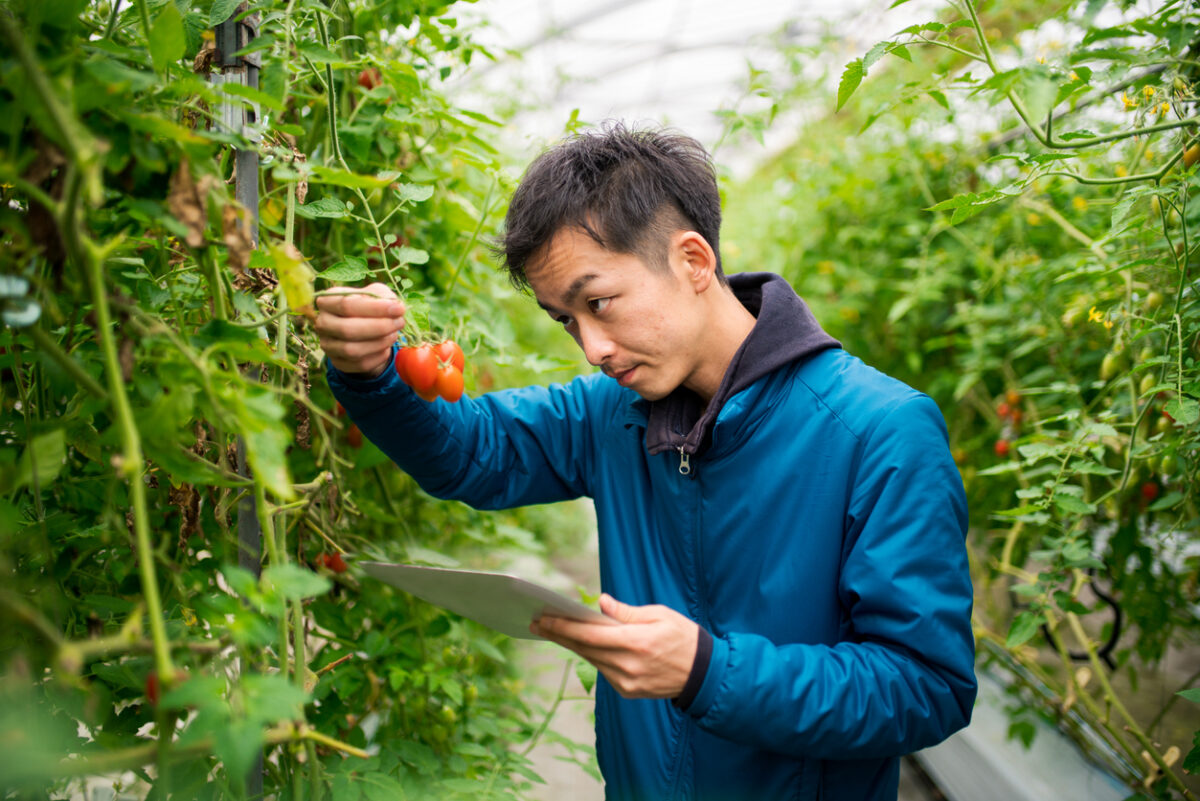Job applications, CVs, cover letters and interviews: how to land your first job in the food industry

If you’re close to finishing your Bachelor’s, Master’s or apprenticeship scheme, you’ll have nearly completed the bulk of the hard work to get into the food industry. The qualifications and experience you will have earned are essential to helping you find a role you love in the sector, but there’s one more step to complete as you begin your job search: applications, CVs, cover letters and interviews.
Preparing these may seem straightforward and obvious, or you might have no idea where to begin. Regardless of how you feel about the job application process, it’s worth dedicating some time to it as it’ll be essential to helping you secure your dream role.
If you’re thinking about applying for a job in food and drink, it’s important you make sure you know how to put together a strong application that will help you sell yourself to employers. Depending on the size of the company, your application might be read by several members of an HR department before it gets the chance to be seen by your potential employer, so you need to put in time and effort to make sure you stand out as a top candidate.
During the Food Matters Live Inspiring Careers in Food event which took place in London earlier this month, we heard from a series of experts on the subject of job applications: Louise Jones Career Coach at City, University of London, Vicky Ransley, Careers Consultant Team Leader in the Employability and Careers department at University of Surrey, and Dr Sue Reeves, Head of Teaching and Learning at University of Roehampton. Here’s what advice they gave on how best to prepare for the job application process in the food industry.

From left to right: Food Matters Live’s Editor Stef Bottinelli, Dr Sue Reeves, Vicky Ransley and Louise Jones during the Career event panel in London

Student asking question to the panel at Food Matters Live Career event in London
Left: From left to right: Food Matters Live’s Editor Stef Bottinelli, Dr Sue Reeves, Vicky Ransley and Louise Jones during the Career event panel in London
Right: Student asking question to the panel at Food Matters Live Career event in London
What should my CV look like/what should it include?
- Two A4 sides in length – ideally no more, no less (e.g. don’t have one side full and the other half empty).
- It should pass the ‘arm’s length’ test: hold your CV in front of you at arm’s length, if it’s still legible, it’s good to go.
- It should be look attractive in its presentation, separated out into different, neat sections on relevant experience, other experience related to the job and your education. If you’re applying to a more creative role in the sector, such as a graphic design-based position, you may want to show evidence of your design skills through the layout of your CV.
- A portfolio of your work, depending on what role you’re applying for (if it’s a website design, media or marketing role for instance, you may be asked to prepare a portfolio of your past work to send with your application).
- Soft skills: time management, teamwork, creative thinking, communication, responsibility, leadership, self-motivation, empathy, assertiveness, public speaking, among others. These skills shouldn’t be listed out but should include clear evidence to show where and how you acquired them.
- Key skills: the skills which may be mentioned in the job description. Make sure they’re clear, and again – don’t just list, explain how you got them.
- Evidence: details as to why you suit the role. If you haven’t included them already, mention the skills you gained from previous work experience, your degree or part time jobs and how they make you a match for the candidate an employer is looking for in the job description.
- Your career objectives: what you’re looking for in a job and why. They should be clear and concise, placed at the top of the document.
Some important questions to ask yourself as you’re writing your CV may include, “Why have you put the CV together? What are you looking for and why?”, says Louise Jones. It’s also important to think about why you’ve chosen to apply to a specific organisation. “I recently saw in a survey that one of the top reasons why employers are deselecting candidates graduate level was they had not shown enough research. By that, they mean research into the organisation – understanding what the organisation does and tailoring your application and not just your cover letter.” Instead of applying to several organisations at once, you should create a CV and cover letter for one company at a time as this makes it easier to properly learn about and research the organisation.
You may have heard of employers only looking at a CV for a couple of seconds before promptly discarding them and moving onto the next one. This is often either because someone hasn’t spent enough time crafting their CV properly for application, or because they undersold themselves. A good CV needs to look like it’s worth something, says Vicky Ransley: “A good tip that I heard once is you should imagine that every line on your CV is worth 100 pounds. Imagine if someone is looking at your CV, how much value are you giving the reader in each line? You really want it to be packed with the skills and detail about the experience you have.”
You need to make sure you can show how you have the skills they’re looking for in your CV, and how you might align with the organisation’s own motives and ethics. “Think about what the values are of that organisation and what’s in the [candidate] specification for that role?”, adds Louise. Looking at the job specification and the company’s website will be useful here. When you read through this document you should be able to match the skills mentioned to the ones being asked for in the application, as well as many of the organisation’s core values as you can.
But how do you know what skills are essential to include and which can be skipped? When you’re putting your application together, it’s worth doing “a skills audit”, says Dr Sue Reeves, to take account of skills you’ve developed that you might not realise. She told Food Matters Live: “At the end of your degree, you don’t just have the degree, you’ve developed lots of other skills during that time. Whether that’s writing, communication, you’ve probably done talks, you’ve done teamwork, you’ve had to show independence when you’ve done your dissertations.”
Vicky echoes this advice, saying: “It might feel obvious to talk about communication, teamwork, time management, but actually it’s really helpful for the employer to spell that out for them. Also, if you can put your skills alongside evidence, it just gives them a bit more validity.”
If you have space on your CV, you shouldn’t be afraid to include skills you’ve gained from extra-curricular activities, such as working in a bar or supermarket, or being part of a society. “You can evidence lots of skills from those experiences, and if you can get involved in things at university and really embrace your time there will really help you. Things like being a course rep or part of a society always goes down really well. [Employers] are interested in you as all rounded individuals, not just as students.”
While it can be useful to include your extracurricular interests, you need to make sure you explain what skills you gained from them that an employer might want to see. As Louise says, “You shouldn’t be including just a list of swimming, reading, seeing my friends – you need to put it into context.” You need to get this information across as concisely as possible however, it’s not an essay! “You need to blow your own trumpet a bit, but you don’t want it to be wordy, you’ve got to get it down to a few bullet points,” adds Louise.
What should my cover letter look like/what should it include?
- Maximum one side of A4 in length
- It should be set out in clear, concise paragraphs
- Information on why you’ve chosen to apply to the role and the organisation
- Evidence of where you obtained the skills that match the job specification, and why it makes you a perfect candidate for the role
- Enthusiasm about getting to the next stage of the application
What’s the difference between a CV and cover letter? While the former gives employers an overview of your relevant experience and qualifications, the latter is like a supporting statement, where you’re able to introduce yourself, your interest in the position and why you think you’d make a great match for the role. You should treat your cover letter like a “sales pitch”, says Vicky Ransley, as it will likely help employers make the final decision on whether you’ll be taken through to the next stage of the application process.
While you should tailor all parts of your application to the company you’re applying to as much as you can, the covering letter is where you get to explain why it is you want to work for that specific organisation. “It might be that they’ve had some really exciting projects recently,” says Vicky, “maybe they make some products that you love, maybe their values and ethos resonate with yours – any of those things will just communicate to the employee that you have researched and understood their company.”
The cover letter is also where you get the chance to show off your key skills. It’s important not to repeat too much of what you’ve mentioned in your CV here, says Vicky, but do focus on the skills that match what they’re looking for, and make sure it’s written in clear, concise paragraphs.
Showing you’re excited to have the potential to meet with the employer is also always worth something in a cover letter. As Vicky says, “It’s also a good idea to end it with your enthusiasm, saying that you’re excited to have an interview or speak with the employer soon.”
Preparing for an interview
You’ve made it past the first hurdle. You submitted your application and have been called for an interview. It’s a great first step as it shows the employer sees value and is interested in what you have to offer. Now onto the next stage: preparing for the interview. Whatever you do, don’t skip this! Louise explains: “Employers will cite it time and time again. They see candidates in an interview who are not well researched enough about the organisation.” While you may hear of some people winging interviews, it’s not going to get you far in the job application process, and the more prepared you are the more likely an employer is going to want you to work for them.
There are a range of questions that could be asked in the interview, some of which may include:
- Tell us why you want to work here?
- Tell us about yourself?
- How did you hear about this position?
- Why are you interested in working for this company?
- What are your greatest strengths?
- What can you bring to the company?
“If candidates can explain company values and how they align with their own, that’s good research,” says Louise. “Think about how you meet certain competencies, using evidence to explain why and how you developed and demonstrated specific skills.”
Some people find the STAR technique, a useful reference in preparation for first interview questions like those mentioned above. The acronym stands for:
- Situation: describing the situation and where it happened (e.g. a project at university or a previous internship)
- Task: detail the task at hand and what you were aiming to achieve
- Action: what action did you take to achieve your goal
- Result: what was the result from your action and what did you learn from it? Would there be anything you’d do differently if you were faced with this situation/task again?
Preparation is key for every applicant, but especially if you’re not comfortable with public speaking and get nervous easily. If you’ve gone through all your preparatory questions, made sure you know how to expand on all the skills and information you included in your CV and cover letter, you’ll feel more confident in yourself and ready to face the interview. As Vicky says, “Even if you’re going in and you’re still feeling nervous, at least you can say to yourself: ‘Well, I’ve done everything I can and just go in there and go for it!”
Online interviews have become quite common since the pandemic began in 2020. While they might not be the norm for everyone, if you are invited to one you need to prepare yourself in the same way you would for something face-to-face. “Initial interviews are often done online”, says Sue. “You must make sure you fit an online interview the same way you would an in-person interview – wear the same clothes, prep in the same way, and treat it just as formally. It may be online, but it’s still a formal interview.”
Careers advisors
Before you start thinking about sending out applications for food industry roles, if you’re still at university, you should prioritise setting up an appointment to see your careers advisor. As Louise explains, “Because you’re writing about yourself – and we all get a little bit awkward with that – it’s good to just get a second pair of eyes and get that input and feedback.” People working here have years of experience in the recruitment industry, so they often know best when it comes to what employers are looking for. They’ll help you think about how to structure these documents and figure out what you might include.
Meeting with a careers advisor can be extremely beneficial during your job application process. You’ll learn the ins-and-outs of how to tackle application forms, as not every application nowadays requires you to send a CV and covering letter by email. Advisors can help you figure out how to tackle the questions being asked and respond using the guided (and often quite minimal!) word limit. They’re also on hand to help you with the interview process too, offering mock interviews, and the opportunity to get proper interview practice and feedback. University careers centres offer a range of different resources for improving your interviewing skills. As Louise explains: “At City, we have a technical interview stream where you can build your confidence with interviews by watching yourself back and answering different competency questions.”
Whatever aspect you’re unsure about when it comes to job applications, advisors can help you make sense of the process, develop your confidence, and guide you towards your first role in the food industry.









